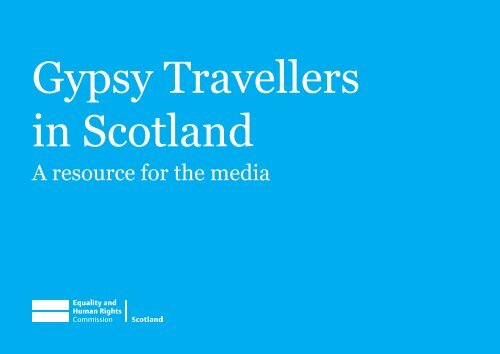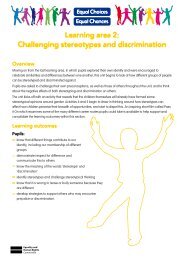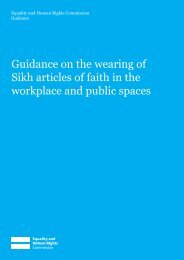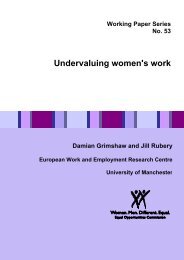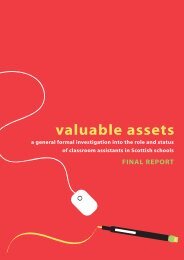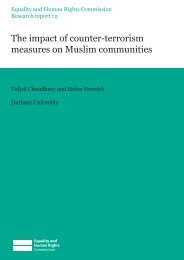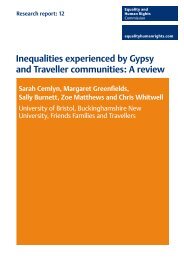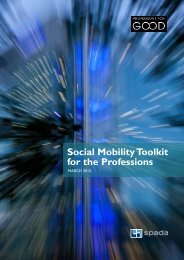Gypsy Travellers in Scotland - Equality and Human Rights ...
Gypsy Travellers in Scotland - Equality and Human Rights ...
Gypsy Travellers in Scotland - Equality and Human Rights ...
Create successful ePaper yourself
Turn your PDF publications into a flip-book with our unique Google optimized e-Paper software.
<strong>Gypsy</strong> <strong>Travellers</strong><br />
<strong>in</strong> <strong>Scotl<strong>and</strong></strong><br />
A resource for the media
“People get upset with the<br />
myths <strong>in</strong> the media, don’t tar<br />
us all with the same brush.”<br />
Traveller Woman, Grampian<br />
3
<strong>Gypsy</strong> <strong>Travellers</strong><br />
Foreword<br />
<strong>Gypsy</strong> <strong>Travellers</strong> are no longer a ‘forgotten m<strong>in</strong>ority’.<br />
Both the local <strong>and</strong> national media regularly cover stories<br />
relat<strong>in</strong>g to <strong>Gypsy</strong> Traveller issues <strong>and</strong> while the majority<br />
of people <strong>in</strong> <strong>Scotl<strong>and</strong></strong> have probably never know<strong>in</strong>gly met<br />
a <strong>Gypsy</strong> Traveller they often still hold firm op<strong>in</strong>ions about<br />
them.<br />
Although the media does cover <strong>Gypsy</strong> Traveller issues,<br />
we at the The <strong>Equality</strong> <strong>and</strong> <strong>Human</strong> <strong>Rights</strong> Commission<br />
<strong>in</strong> <strong>Scotl<strong>and</strong></strong> are concerned that this coverage is often<br />
unbalanced. <strong>Gypsy</strong> <strong>Travellers</strong> are as diverse as any other<br />
ethnic group <strong>and</strong> we recognise that, as with any other<br />
ethnic group, there are a small m<strong>in</strong>ority of <strong>in</strong>dividuals<br />
who engage <strong>in</strong> unlawful behaviour. However, the<br />
tendency of the media to focus on these <strong>in</strong>cidents can<br />
result <strong>in</strong> <strong>in</strong>creased prejudice. We do not th<strong>in</strong>k that most<br />
4<br />
journalists <strong>in</strong>tend to foster stereotypes but rather, that<br />
their lack of engagement with <strong>Gypsy</strong> <strong>Travellers</strong> results<br />
<strong>in</strong> coverage which is both one-sided <strong>and</strong> <strong>in</strong>accurate.<br />
This then serves to validate the idea that somehow<br />
<strong>Gypsy</strong> <strong>Travellers</strong> are ‘fair game’ - that it is not racist to<br />
stereotype or discrim<strong>in</strong>ate aga<strong>in</strong>st a <strong>Gypsy</strong> Traveller.<br />
Media coverage has a real impact on <strong>in</strong>dividual people’s<br />
lives. There have been many specific <strong>in</strong>cidents where<br />
erroneous report<strong>in</strong>g of <strong>Gypsy</strong> Traveller issues <strong>in</strong> <strong>Scotl<strong>and</strong></strong><br />
has resulted <strong>in</strong> people, <strong>in</strong>clud<strong>in</strong>g children, be<strong>in</strong>g harassed,<br />
bullied <strong>and</strong> even beaten up. Equally, balanced media<br />
coverage can help to foster greater underst<strong>and</strong><strong>in</strong>g<br />
between <strong>and</strong> with<strong>in</strong> communities <strong>and</strong> encourage action to<br />
address the issues that impact on both <strong>Gypsy</strong> <strong>Travellers</strong><br />
<strong>and</strong> the settled community.
We ourselves do not represent any particular group or groups.<br />
Our remit is to support the eradication of <strong>in</strong>equalities <strong>and</strong> to<br />
encourage good race relations between all groups. We have<br />
produced this leaflet as a resource for journalists <strong>and</strong> others<br />
about <strong>Gypsy</strong> <strong>Travellers</strong>. It conta<strong>in</strong>s facts <strong>and</strong> figures about the<br />
key issues that affect <strong>Gypsy</strong> <strong>Travellers</strong>, advice about term<strong>in</strong>ology<br />
<strong>and</strong> how to h<strong>and</strong>le issues of concern, <strong>and</strong> contact details for<br />
organisations who work with <strong>Gypsy</strong> <strong>Travellers</strong> <strong>in</strong> <strong>Scotl<strong>and</strong></strong>.<br />
Obviously it is impossible to produce a complete guide to any<br />
ethnic group, but <strong>in</strong> putt<strong>in</strong>g this leaflet together we have spoken<br />
to <strong>in</strong>dividual <strong>Gypsy</strong> <strong>Travellers</strong> <strong>and</strong> have tried to reflect their<br />
voices with<strong>in</strong> it. We do not want to dissuade journalists from<br />
cover<strong>in</strong>g stories about <strong>Gypsy</strong> <strong>Travellers</strong> but rather to encourage a<br />
more accurate, fair, open <strong>and</strong> <strong>in</strong>clusive discourse about the issues<br />
<strong>in</strong>volved.<br />
The <strong>Equality</strong> <strong>and</strong> <strong>Human</strong> <strong>Rights</strong> Commission <strong>Scotl<strong>and</strong></strong>, 2010<br />
5
<strong>Gypsy</strong> <strong>Travellers</strong><br />
Contents<br />
8 Term<strong>in</strong>ology<br />
10 Orig<strong>in</strong>s of <strong>Gypsy</strong> <strong>Travellers</strong><br />
11 Economics<br />
12 Culture<br />
14 Accommodation Issues<br />
18 Health Issues<br />
6<br />
19 Education Issues<br />
21 Law<br />
22 Deal<strong>in</strong>g with Issues of Concern<br />
24 Contacts<br />
26 Resources
“People criticise <strong>Travellers</strong> without know<strong>in</strong>g anyth<strong>in</strong>g about them.<br />
Some say, we harm the environment. That’s not true. <strong>Travellers</strong> are<br />
country people, they love the countryside. I’ve never been to a police<br />
station <strong>in</strong> my life, never to court, have never had a conviction <strong>and</strong><br />
have never lost a po<strong>in</strong>t on my licence <strong>in</strong> 45 years of driv<strong>in</strong>g. Not too<br />
many people can say that. But it doesn’t stop us always be<strong>in</strong>g the<br />
first to get the blame if anyth<strong>in</strong>g goes miss<strong>in</strong>g. What people don’t<br />
underst<strong>and</strong> is that a travell<strong>in</strong>g person is not a thief.”<br />
<strong>Gypsy</strong>/ Traveller Man, Perthshire<br />
7
<strong>Gypsy</strong> <strong>Travellers</strong><br />
Term<strong>in</strong>ology<br />
The Commission advocates the use of the follow<strong>in</strong>g<br />
term<strong>in</strong>ology, as used by the Scottish Government , which<br />
acknowledges the social <strong>and</strong> cultural differences between<br />
Traveller communities <strong>in</strong> <strong>Scotl<strong>and</strong></strong>. As with all communities<br />
there are differences of op<strong>in</strong>ion about term<strong>in</strong>ology <strong>and</strong> we<br />
recognise that each <strong>in</strong>dividual has the right to self-def<strong>in</strong>e.<br />
Terms should always be capitalised, as below.<br />
<strong>Gypsy</strong> Traveller (plural <strong>Gypsy</strong> <strong>Travellers</strong>)<br />
Those groups of <strong>Travellers</strong> <strong>in</strong> <strong>Scotl<strong>and</strong></strong> who variously refer<br />
to themselves as <strong>Travellers</strong>, Scottish <strong>Travellers</strong>, <strong>Gypsy</strong><br />
<strong>Travellers</strong> <strong>and</strong> <strong>Gypsy</strong> Traveller people. This <strong>in</strong>cludes English<br />
Gypsies, Irish <strong>Travellers</strong> <strong>and</strong> European Roma. This term<br />
refers to all travell<strong>in</strong>g communities who regard ‘travell<strong>in</strong>g’ as<br />
an important aspect of their ethnic/cultural identity. <strong>Gypsy</strong><br />
<strong>Travellers</strong> are the only of these groups to be protected by<br />
equalities legislation.<br />
Occupational Traveller<br />
People who def<strong>in</strong>e themselves <strong>in</strong> terms of their bus<strong>in</strong>esses,<br />
for example Showpeople, Fairground people, Circus People.<br />
8<br />
It is mislead<strong>in</strong>g to refer to them as <strong>Travellers</strong> <strong>and</strong> may cause<br />
confusion.<br />
Showpeople<br />
Members of a group organised for the purposes of hold<strong>in</strong>g<br />
fairs, circus’s or shows (whether or not travell<strong>in</strong>g together<br />
as such). This <strong>in</strong>cludes such people who on the grounds of<br />
their own or the families or their dependents more localised<br />
pattern of trad<strong>in</strong>g, educational or health needs or old age<br />
have ceased to travel temporarily or permanently, but which<br />
exclude Gypsies or <strong>Travellers</strong> (Office of the Deputy Prime<br />
M<strong>in</strong>ister 2007).<br />
New Age Traveller<br />
People who comprise social group<strong>in</strong>gs that advocate<br />
alternative life-styles, frequently for political or issue based<br />
reasons.<br />
The settled community<br />
The population outwith that of <strong>Gypsy</strong> <strong>and</strong> Traveller<br />
communities.
“There seems to be tolerance of other<br />
cultures but not ours. People believe that<br />
you should do exactly the same as them<br />
because your sk<strong>in</strong> is white.”<br />
<strong>Gypsy</strong> Traveller Woman, Perthshire<br />
9
<strong>Gypsy</strong> <strong>Travellers</strong><br />
Orig<strong>in</strong>s of <strong>Gypsy</strong> <strong>Travellers</strong><br />
<strong>Gypsy</strong> <strong>Travellers</strong> belong to <strong>Scotl<strong>and</strong></strong> <strong>and</strong> cont<strong>in</strong>ue to make a<br />
rich <strong>and</strong> valuable contribution to the country’s economic <strong>and</strong><br />
cultural life. They have a long shared history with references to<br />
the presence of <strong>Gypsy</strong> <strong>Travellers</strong> <strong>in</strong> <strong>Scotl<strong>and</strong></strong> dat<strong>in</strong>g back to the<br />
12th century. There are a number of theories about the orig<strong>in</strong><br />
of <strong>Gypsy</strong> <strong>Travellers</strong>. Some people argue that they trace their<br />
roots to a Celtic or possibly pre-Celtic population <strong>in</strong> <strong>Scotl<strong>and</strong></strong>.<br />
Others suggest that <strong>Gypsy</strong> <strong>Travellers</strong> may have descended from<br />
Roman slaves who were brought over to Brita<strong>in</strong> as armourers.<br />
It is thought likely that over time the populations may have<br />
<strong>in</strong>termixed with other groups, such as the Gypsies who<br />
migrated from India. As with any ethnic group, there is considerable<br />
diversity with<strong>in</strong> the <strong>Gypsy</strong> Traveller population <strong>and</strong><br />
<strong>in</strong>dividuals are proud of their own dist<strong>in</strong>ct family histories.<br />
In addition to speak<strong>in</strong>g English <strong>and</strong>/or Gaelic <strong>Gypsy</strong> <strong>Travellers</strong><br />
have a common language, Cant, which is said to come from<br />
the Gaelic ‘ca<strong>in</strong>nt’ mean<strong>in</strong>g ‘speech’. Cant vocabulary comes<br />
from a range of sources <strong>in</strong>clud<strong>in</strong>g: Gaelic, Sanskrit, Scots <strong>and</strong><br />
Romany.<br />
10<br />
The current population of <strong>Gypsy</strong> <strong>Travellers</strong> <strong>in</strong> <strong>Scotl<strong>and</strong></strong> is<br />
unknown. The most recent Scottish Government estimate<br />
be<strong>in</strong>g 1,547 people 1 , but this is acknowledged to be a severe<br />
underestimate as it excludes the thous<strong>and</strong>s of <strong>Gypsy</strong><br />
<strong>Travellers</strong> liv<strong>in</strong>g <strong>in</strong> hous<strong>in</strong>g for some or all of the year. Many<br />
people are afraid to identify themselves as a <strong>Gypsy</strong> Traveller<br />
because of the extreme discrim<strong>in</strong>ation <strong>and</strong> prejudice they<br />
have experienced <strong>in</strong> the past. Consequently <strong>Gypsy</strong> <strong>Travellers</strong><br />
estimate that their community actually <strong>in</strong>cludes more than<br />
15,000 people.<br />
One of the most common misrepresentations of <strong>Gypsy</strong><br />
<strong>Travellers</strong> is that if they do not live <strong>in</strong> a caravan they cannot<br />
be classed as be<strong>in</strong>g a <strong>Gypsy</strong> Traveller. The reality is that many<br />
<strong>Gypsy</strong> <strong>Travellers</strong> <strong>in</strong> <strong>Scotl<strong>and</strong></strong> overw<strong>in</strong>ter <strong>in</strong> hous<strong>in</strong>g (often<br />
privately rented) <strong>and</strong> that for family or social reasons – such as<br />
br<strong>in</strong>g<strong>in</strong>g up children or car<strong>in</strong>g for older relatives – many <strong>Gypsy</strong><br />
<strong>Travellers</strong> have temporarily given up life on the road. That does<br />
not mean that they are no longer <strong>Gypsy</strong> <strong>Travellers</strong> or cont<strong>in</strong>ue<br />
their own culture, just that for the moment they are not<br />
travell<strong>in</strong>g. Just as Indian people do not lose their “Indianess”<br />
when they leave India, neither do <strong>Travellers</strong> lose their identity<br />
when temporarily or permanently housed.
Economics<br />
Although people tend to associate <strong>Gypsy</strong> <strong>Travellers</strong> with<br />
rural-based economic activities, such as farm work,<br />
like any sector of the population <strong>Gypsy</strong> <strong>Travellers</strong> are<br />
engaged <strong>in</strong> a wide variety of employment from forestry<br />
to teach<strong>in</strong>g. In addition, many <strong>Gypsy</strong> <strong>Travellers</strong> still pass<br />
their traditional skills on to the next generation. Famous<br />
<strong>Gypsy</strong> <strong>Travellers</strong> <strong>in</strong>clude: Charlie Chapl<strong>in</strong>, Rita Hayworth,<br />
Bob Hosk<strong>in</strong>s <strong>and</strong> Shayne Ward. It is even claimed that<br />
Bill Cl<strong>in</strong>ton, former President of the United States is<br />
descended from the Faa Blythe Scottish <strong>Gypsy</strong> K<strong>in</strong>gs <strong>and</strong><br />
Queens. 2<br />
<strong>Gypsy</strong> <strong>Travellers</strong> contribute to society economically <strong>and</strong><br />
socially. On official sites council tax is always collected.<br />
11
<strong>Gypsy</strong> <strong>Travellers</strong><br />
Culture<br />
<strong>Gypsy</strong> <strong>Travellers</strong> have a very strong sense of their own<br />
culture, traditions <strong>and</strong> community. They are also proud<br />
of their Scottish identity, often emphasis<strong>in</strong>g the role that<br />
their relatives played <strong>in</strong> the armed forces <strong>and</strong> the l<strong>and</strong><br />
effort dur<strong>in</strong>g the two world wars. But as one man puts<br />
it: “they’ll recognise us when we sign up to fight for our<br />
country, but they won’t recognise our right to live here.”<br />
<strong>Gypsy</strong> Traveller music, story-tell<strong>in</strong>g <strong>and</strong> art have long<br />
been part of <strong>Scotl<strong>and</strong></strong>’s wider cultural heritage. Storytellers<br />
such as Duncan Williamson <strong>and</strong> Jess Smith <strong>and</strong><br />
s<strong>in</strong>gers such as Sheila Stewart <strong>and</strong> Mart<strong>in</strong> Taylor cont<strong>in</strong>ue<br />
to contribute to <strong>Scotl<strong>and</strong></strong>’s cultural life today.<br />
12<br />
Extended family ties are very important to many <strong>Gypsy</strong><br />
<strong>Travellers</strong>. Recent peer research by young <strong>Gypsy</strong><br />
<strong>Travellers</strong> showed that nearly half of those surveyed<br />
identified be<strong>in</strong>g close to their family or other <strong>Gypsy</strong><br />
<strong>Travellers</strong> as be<strong>in</strong>g the ‘best th<strong>in</strong>g’ about life. 3
“Nobody objects to 850,000 members of the<br />
caravan club, but it’s not acceptable for me<br />
to travel. They can stop, we can’t.”<br />
<strong>Gypsy</strong> Traveller Man, Perthshire<br />
13
<strong>Gypsy</strong> <strong>Travellers</strong><br />
Accommodation issues<br />
For decades the accommodation needs of <strong>Gypsy</strong><br />
<strong>Travellers</strong> have been largely ignored. <strong>Gypsy</strong> <strong>Travellers</strong><br />
require a range of accommodation provision encompass<strong>in</strong>g<br />
sites, hous<strong>in</strong>g <strong>and</strong> road-side camps <strong>in</strong> order to meet<br />
their <strong>in</strong>dividual needs <strong>and</strong> circumstances. For many<br />
<strong>Gypsy</strong> <strong>Travellers</strong> travell<strong>in</strong>g is not a ‘life-style’ choice, but<br />
a strong part of their cultural heritage <strong>and</strong> an <strong>in</strong>tegral<br />
part of their be<strong>in</strong>g. Traditionally many <strong>Gypsy</strong> <strong>Travellers</strong><br />
had a w<strong>in</strong>ter<strong>in</strong>g place <strong>and</strong> then travel throughout the rest<br />
of the year. Some <strong>Gypsy</strong> <strong>Travellers</strong> still follow a similar<br />
pattern today, liv<strong>in</strong>g <strong>in</strong> one place dur<strong>in</strong>g the w<strong>in</strong>ter, so for<br />
example their children can go to school, <strong>and</strong> travell<strong>in</strong>g<br />
dur<strong>in</strong>g the summer.<br />
Sites<br />
The first council-owned site <strong>in</strong> <strong>Scotl<strong>and</strong></strong> was only<br />
established <strong>in</strong> Argyll <strong>and</strong> Bute <strong>in</strong> 1978. Dur<strong>in</strong>g the 1980s<br />
<strong>and</strong> early 1990s local authorities made use of a Scottish<br />
Office grant scheme to build sites, but s<strong>in</strong>ce then some<br />
sites have fallen <strong>in</strong>to disrepair <strong>and</strong> others have closed.<br />
In spite of Scottish Government guidance stat<strong>in</strong>g that<br />
14<br />
plann<strong>in</strong>g authorities must identify <strong>Gypsy</strong> Traveller sites,<br />
the number of all-year council-owned pitches for <strong>Gypsy</strong><br />
<strong>Travellers</strong> <strong>in</strong> <strong>Scotl<strong>and</strong></strong> has decl<strong>in</strong>ed from 560 <strong>in</strong> 2003 to<br />
480 <strong>in</strong> 2006. 4<br />
Current council site provision does not meet the needs<br />
of <strong>Gypsy</strong> <strong>Travellers</strong>. Although three-quarters of councilowned<br />
<strong>Gypsy</strong> Traveller pitches are currently let, 5 three<br />
ma<strong>in</strong>l<strong>and</strong> councils still do not provide any sites <strong>and</strong> half<br />
of the councils who responded to a recent survey about<br />
services for <strong>Gypsy</strong> <strong>Travellers</strong> <strong>in</strong>dicated that their sites are<br />
poorly located. Some are crossed by electricity pylons;<br />
others are with<strong>in</strong> 300 metres of a motorway; on l<strong>and</strong><br />
liable to flood<strong>in</strong>g; close to a large electricity substation<br />
or close to active l<strong>and</strong>fill sites. 6 Pitch rents are also high,<br />
with one Scottish site currently charg<strong>in</strong>g £67.93 a week.<br />
More than half (58%) of councils charge higher rents for<br />
<strong>Gypsy</strong> Traveller pitches than they do for council houses. 7<br />
In return for their rent <strong>Gypsy</strong> <strong>Travellers</strong> receive an area<br />
of hard st<strong>and</strong><strong>in</strong>g <strong>and</strong> an amenity unit with bath/shower,<br />
toilet facilities <strong>and</strong> limited space for domestic appliances/
household storage. Pitches have space to accommodate a<br />
large residential trailer caravan <strong>and</strong> vehicle park<strong>in</strong>g space<br />
for a van or lorry. 8 Many families also need, or prefer, to<br />
have a second caravan to provide sufficient liv<strong>in</strong>g space<br />
for the whole family. Recent research commissioned<br />
by the Commission (2010) suggests that despite be<strong>in</strong>g<br />
required by Government to provide accommodation<br />
only 1 <strong>in</strong> 5 Local Authorities could actually quantify the<br />
amount of pitches required <strong>in</strong> their area.<br />
Other <strong>Gypsy</strong> <strong>Travellers</strong> prefer to access privately-owned<br />
caravan sites, <strong>in</strong>clud<strong>in</strong>g those that have been established<br />
by <strong>Gypsy</strong> <strong>Travellers</strong> themselves or tour<strong>in</strong>g caravan sites<br />
which will occasionally accommodate <strong>Gypsy</strong> <strong>Travellers</strong> at<br />
certa<strong>in</strong> times of the year. Some <strong>Gypsy</strong> <strong>Travellers</strong> are keen<br />
to establish their own sites, but feel that the plann<strong>in</strong>g<br />
system discrim<strong>in</strong>ates aga<strong>in</strong>st them. Although there are<br />
no figures for <strong>Scotl<strong>and</strong></strong>, <strong>in</strong> Engl<strong>and</strong> over 90% of plann<strong>in</strong>g<br />
applications by <strong>Gypsy</strong> <strong>Travellers</strong> are refused compared<br />
to only 20% of plann<strong>in</strong>g applications by the settled<br />
community. 9<br />
Road-side camps<br />
In recent years councils have blocked off many of the<br />
traditional stopp<strong>in</strong>g places used by <strong>Gypsy</strong> <strong>Travellers</strong>. As<br />
a result <strong>Gypsy</strong> <strong>Travellers</strong> have ended up be<strong>in</strong>g compelled<br />
to camp <strong>in</strong> places that are closer to the settled population<br />
<strong>and</strong> this has often become a source of tension. Given<br />
the <strong>in</strong>adequate provision of council-owned sites <strong>and</strong> the<br />
difficulties <strong>in</strong> gett<strong>in</strong>g plann<strong>in</strong>g permission for private<br />
sites, road-side camp<strong>in</strong>g can be the only option for some<br />
families.<br />
Road-side camp<strong>in</strong>g is often blamed for caus<strong>in</strong>g mess<br />
which can <strong>in</strong>cur clear-up costs. Yet, there are good<br />
examples of councils provid<strong>in</strong>g skips <strong>and</strong> portaloos for<br />
road-side camps, a service which the <strong>Gypsy</strong> <strong>Travellers</strong> on<br />
the camp pay for. Many <strong>Gypsy</strong> <strong>Travellers</strong> are concerned<br />
by the tensions caused by the current situation <strong>and</strong><br />
have suggested a number of solutions. These <strong>in</strong>clude<br />
the establishment of a network of transit sites (areas<br />
with hard-st<strong>and</strong><strong>in</strong>g, skips <strong>and</strong> portaloos which <strong>Gypsy</strong><br />
<strong>Travellers</strong> can pull on to for a short period of time) <strong>and</strong><br />
15
<strong>Gypsy</strong> <strong>Travellers</strong><br />
agree<strong>in</strong>g a charter of traditional stopp<strong>in</strong>g places which<br />
<strong>Gypsy</strong> <strong>Travellers</strong> can use.<br />
The Commission research (2010) confirms that there is<br />
a significant shortfall of supply <strong>in</strong> summer months when<br />
the community tends to “hit the road.” This shortfall<br />
is largely to blame for the persistence of roadside<br />
encampments, with <strong>Gypsy</strong> <strong>Travellers</strong> simply hav<strong>in</strong>g<br />
nowhere suitable to go.<br />
Hous<strong>in</strong>g<br />
There is no estimate of the numbers of <strong>Gypsy</strong> <strong>Travellers</strong><br />
liv<strong>in</strong>g <strong>in</strong> hous<strong>in</strong>g <strong>in</strong> <strong>Scotl<strong>and</strong></strong>. Many <strong>Gypsy</strong> <strong>Travellers</strong><br />
choose to live <strong>in</strong> house for significant periods of time, to<br />
look after young children or to care for older members<br />
16<br />
of the community. Others feel that they are forced to do<br />
so, either because they are unable to f<strong>in</strong>d a suitable pitch<br />
or because it is the only way to avoid the widespread discrim<strong>in</strong>ation<br />
which they would otherwise experience at<br />
work, at school or <strong>in</strong> the provision of services, such as<br />
access to a GP. Studies have shown that <strong>Gypsy</strong> <strong>Travellers</strong><br />
who move <strong>in</strong>to houses suffer poorer health than those<br />
who are liv<strong>in</strong>g on a site or on the road. 10 However by<br />
choos<strong>in</strong>g, or simply hav<strong>in</strong>g to live <strong>in</strong> a house, <strong>Gypsy</strong><br />
<strong>Travellers</strong> do not give up aspects of their cultural or legal<br />
identity.
“You can live <strong>in</strong> a house, but it<br />
doesn’t take the <strong>Gypsy</strong> out of you.”<br />
<strong>Gypsy</strong> Woman, Ed<strong>in</strong>burgh<br />
17
<strong>Gypsy</strong> <strong>Travellers</strong><br />
Health issues<br />
Many of <strong>Scotl<strong>and</strong></strong>’s health services cont<strong>in</strong>ue to exclude<br />
<strong>Gypsy</strong> <strong>Travellers</strong>. Some GPs surgeries refuse to register<br />
<strong>Gypsy</strong> <strong>Travellers</strong> as patients <strong>and</strong> doctors are reluctant<br />
to visit sites. As a result <strong>Gypsy</strong> <strong>Travellers</strong> sometimes<br />
have no alternative but to seek care through accident<br />
<strong>and</strong> emergency cl<strong>in</strong>ics. Research among young <strong>Gypsy</strong><br />
<strong>Travellers</strong> has shown that 84% feel that access to a<br />
doctor or dentist has not improved or has got worse s<strong>in</strong>ce<br />
2001. 11 Ma<strong>in</strong>stream health education <strong>and</strong> preventative<br />
programmes rarely <strong>in</strong>clude <strong>Gypsy</strong> <strong>Travellers</strong> <strong>and</strong> the NHS<br />
has done little to engage directly with <strong>Gypsy</strong> <strong>Travellers</strong><br />
about their needs <strong>and</strong> how to meet them.<br />
Inadequate accommodation provision also has an impact<br />
on the health of <strong>Gypsy</strong> <strong>Travellers</strong>. Liv<strong>in</strong>g conditions have<br />
a direct impact on health - over 50% of <strong>Gypsy</strong> <strong>Travellers</strong><br />
have spent at least part of their life without access to<br />
runn<strong>in</strong>g water. However, wider accommodation issues,<br />
such as <strong>in</strong>security of tenure, limited access to services <strong>and</strong><br />
distance from extended family can also affect the health<br />
of <strong>Gypsy</strong> <strong>Travellers</strong>.<br />
18<br />
There has been little Scottish specific research <strong>in</strong>to the<br />
healthcare needs <strong>and</strong> experiences of <strong>Gypsy</strong> <strong>Travellers</strong>, but<br />
English data shows that <strong>Gypsy</strong> <strong>Travellers</strong> have significantly<br />
poorer health than other UK-resident english-speak<strong>in</strong>g<br />
ethnic m<strong>in</strong>orities <strong>and</strong> economically disadvantaged white<br />
UK residents. 12 <strong>Gypsy</strong> <strong>Travellers</strong> are more likely to suffer<br />
from selfreported anxiety, respiratory problems <strong>and</strong> chest<br />
pa<strong>in</strong> than other ethnic groups with<strong>in</strong> the UK population.<br />
They also have one of the highest maternal death rates<br />
<strong>in</strong> the UK. Anecdotal evidence suggests that <strong>Gypsy</strong><br />
<strong>Travellers</strong> experience a similar level of health <strong>in</strong>equalities<br />
as their English counterparts - one Scottish GP estimates<br />
that the average life expectancy of <strong>Gypsy</strong> <strong>Travellers</strong> is<br />
only 55 years. 13<br />
The recent <strong>in</strong>troduction of h<strong>and</strong>-held health records for<br />
<strong>Gypsy</strong> <strong>Travellers</strong> was viewed as a step forward however,<br />
at the time of writ<strong>in</strong>g there appear to be difficulties with<br />
the implementation of this system.
Education issues<br />
Attempts to meet the educational needs <strong>and</strong> concerns of<br />
<strong>Gypsy</strong> <strong>Travellers</strong> are, at present, patchy. <strong>Gypsy</strong> <strong>Travellers</strong><br />
view education <strong>in</strong> a broad sense, which <strong>in</strong>cludes the skills<br />
they learn from their parents or other elders with<strong>in</strong> the<br />
community 14 as well as formal school<strong>in</strong>g. Most <strong>Gypsy</strong><br />
<strong>Travellers</strong> value the skills that they can ga<strong>in</strong> at school.<br />
However, others are unable to attend school because<br />
they are concerned about their safety. In a recent survey<br />
three-quarters of young <strong>Gypsy</strong> <strong>Travellers</strong> said they have<br />
been picked on by other school pupils because of their<br />
background. 15 Some parents have even been advised by<br />
teachers to tell their children not to let the other pupils<br />
know that they are a <strong>Gypsy</strong> Traveller. 16<br />
Many young <strong>Gypsy</strong> <strong>Travellers</strong> also feel that their culture<br />
<strong>and</strong> heritage is not recognized or valued <strong>in</strong> school <strong>and</strong><br />
some suggest that the secondary school curriculum will<br />
not equip them with the skills they need. Research among<br />
young <strong>Gypsy</strong> <strong>Travellers</strong> has shown that some are keen to<br />
ga<strong>in</strong> experience <strong>and</strong> accreditation <strong>in</strong> fields such as monoblock<strong>in</strong>g,<br />
l<strong>and</strong>scape garden<strong>in</strong>g <strong>and</strong> forestry work - skills<br />
which are not currently taught <strong>in</strong> schools. 17<br />
Interrupted learn<strong>in</strong>g, as a result of travell<strong>in</strong>g may also<br />
have an impact on <strong>Gypsy</strong> Traveller children’s ability to<br />
access ma<strong>in</strong>stream education. Few schools keep formal<br />
contact with travell<strong>in</strong>g pupils or record <strong>in</strong>formation about<br />
the atta<strong>in</strong>ment of <strong>Gypsy</strong> Traveller pupils. 18<br />
Forty-three percent of Scottish education authorities have<br />
appo<strong>in</strong>ted staff to work specifically with <strong>Gypsy</strong> Traveller<br />
children <strong>and</strong> young people. 19 While some teachers only<br />
provide support with<strong>in</strong> schools, others provide teach<strong>in</strong>g<br />
on sites or at roadside camps. The Scottish Government<br />
is also tak<strong>in</strong>g action by fund<strong>in</strong>g work to develop onl<strong>in</strong>e<br />
learn<strong>in</strong>g opportunities for <strong>Gypsy</strong> <strong>Travellers</strong> who are<br />
travell<strong>in</strong>g or cannot attend school. However, parents <strong>and</strong><br />
pupils rema<strong>in</strong> concerned that the majority of teachers<br />
do not underst<strong>and</strong> <strong>Gypsy</strong> Traveller culture, doubt that<br />
the curriculum can meet their needs <strong>and</strong> believe that the<br />
pervasive bully<strong>in</strong>g of <strong>Gypsy</strong> Traveller children is not be<strong>in</strong>g<br />
dealt with effectively.<br />
19
<strong>Gypsy</strong> <strong>Travellers</strong><br />
“We deserve respect <strong>and</strong> we deserve<br />
a voice - just like anybody else.”<br />
<strong>Gypsy</strong> Traveller Woman, Perthshire<br />
20
Law<br />
The Race Relations Act 1976 (RRA) prohibits discrim<strong>in</strong>ation<br />
on racial grounds <strong>in</strong> employment, education, <strong>in</strong> many public<br />
services <strong>and</strong> <strong>in</strong> the provision of goods, facilities <strong>and</strong> services.<br />
In 2001 amendments to the RRA came <strong>in</strong>to force which place<br />
pro-active race equality duties on listed public authorities to<br />
have due regard to the need to elim<strong>in</strong>ate unlawful racial discrim<strong>in</strong>ation<br />
<strong>and</strong> to promote equality of opportunity <strong>and</strong> good<br />
relations between persons of different racial groups.<br />
Racial grounds are def<strong>in</strong>ed <strong>in</strong> the RRA as be<strong>in</strong>g on grounds of<br />
race, colour, nationality or ethnic or national orig<strong>in</strong>. The RRA<br />
also def<strong>in</strong>es a racial group as mean<strong>in</strong>g a group of persons<br />
def<strong>in</strong>ed by reference to colour, race, nationality or ethnic<br />
or national orig<strong>in</strong>s. However, the RRA does not stipulate<br />
which particular groups of people constitute a racial group.<br />
Issues aris<strong>in</strong>g under the RRA, such as whether an <strong>in</strong>dividual<br />
has protection aga<strong>in</strong>st discrim<strong>in</strong>ation on racial grounds or<br />
whether a particular group of people are a racial group <strong>in</strong><br />
terms of the RRA, must be decided by case law <strong>in</strong> the courts.<br />
In Brita<strong>in</strong> there have been three cases relat<strong>in</strong>g to <strong>Gypsy</strong><br />
<strong>Travellers</strong> <strong>and</strong> the RRA, which could be described as test<br />
cases, <strong>in</strong> the sense that they each establish legal precedent for<br />
that sub-group of <strong>Gypsy</strong> <strong>Travellers</strong> be<strong>in</strong>g a racial group under<br />
the RRA. All these cases came before courts <strong>in</strong> Engl<strong>and</strong>.<br />
The first test case, the Commission v. Dutton (1989), was<br />
heard by the Court of Appeal, which established that Gypsies<br />
are a racial group under the RRA. The second test case,<br />
O’Leary v. Allied Domecq (2000) was heard by the Central<br />
London County Court. It established that Irish <strong>Travellers</strong><br />
are a racial group under the RRA. The third case, ERRC <strong>and</strong><br />
Immigration Officer at Prague Airport v The Secretary of State<br />
for the Home Department <strong>and</strong> Another (2003) established<br />
that Roma are a racial group under the RRA. As this is a<br />
judgement from the House of Lords, it has b<strong>in</strong>d<strong>in</strong>g legal<br />
authority on the courts <strong>in</strong> <strong>Scotl<strong>and</strong></strong>.<br />
A recent Tribunal judgement (K McLellan v GTEIP 2009)<br />
held that <strong>Gypsy</strong> <strong>Travellers</strong> are an dist<strong>in</strong>ct ethnic group <strong>and</strong><br />
therefore covered by the RRA 1976.<br />
21
<strong>Gypsy</strong> <strong>Travellers</strong><br />
Deal<strong>in</strong>g with issues of concern<br />
The Commission recognises that as <strong>in</strong> any given sector<br />
of the population there may be some <strong>Gypsy</strong> <strong>Travellers</strong><br />
who behave unlawfully, for example by engag<strong>in</strong>g <strong>in</strong><br />
anti-social behaviour, such as fly-tipp<strong>in</strong>g. The fact that<br />
a small m<strong>in</strong>ority of the population may act unlawfully,<br />
makes <strong>Gypsy</strong> <strong>Travellers</strong> no different from any other group<br />
of people <strong>and</strong> as with anybody else, we would expect the<br />
authorities to deal with this behaviour accord<strong>in</strong>gly <strong>and</strong><br />
the media to report on it <strong>in</strong> the same way as they would <strong>in</strong><br />
relation to other examples of the same behaviour.<br />
However, it is important to dist<strong>in</strong>guish between unlawful<br />
behaviour <strong>and</strong> prejudice aga<strong>in</strong>st behaviour which is seen<br />
to be ‘different’. It is also important to recognise where<br />
stereotypes are advanced <strong>in</strong> the absence of any specific<br />
behaviour.<br />
<strong>Gypsy</strong> <strong>Travellers</strong> need the same services as anybody else,<br />
but as a dist<strong>in</strong>ct ethnic group they have particular cultural<br />
traditions, <strong>in</strong>clud<strong>in</strong>g a tradition of nomadism, which can<br />
22<br />
only be accommodated by adapt<strong>in</strong>g these services. Where<br />
members of the settled community express opposition<br />
to issues, it is important to dist<strong>in</strong>guish between genu<strong>in</strong>e<br />
concerns, for example to a <strong>Gypsy</strong> Traveller site be<strong>in</strong>g<br />
built on green belt l<strong>and</strong>, <strong>and</strong> objections that are based<br />
purely on stereotyp<strong>in</strong>g <strong>and</strong> prejudice, for example the<br />
assumption that the establishment of a new site will result<br />
<strong>in</strong> a rise <strong>in</strong> crime.<br />
Report<strong>in</strong>g on <strong>Gypsy</strong> <strong>Travellers</strong><br />
As with other ethnic groups, journalists should not<br />
give details of a <strong>Gypsy</strong> Traveller’s ethnicity unless it<br />
is genu<strong>in</strong>ely relevant to the story. For example, court<br />
reports should not usually give details of the ethnicity of<br />
someone who has been convicted of a crim<strong>in</strong>al<br />
offence.<br />
In 2009 the Press Compla<strong>in</strong>ts Commission upheld a<br />
compla<strong>in</strong>t aga<strong>in</strong>st the Daily Mail from the Double Dykes<br />
Tenants Association on the Double Dykes <strong>Gypsy</strong> site <strong>in</strong>
Perth, who disputed the claim <strong>in</strong> an article that none<br />
of the <strong>Travellers</strong> who agreed to be <strong>in</strong>terviewed by the<br />
journalist paid council tax.<br />
Whilst the PPC accepted that it would be difficult to prove<br />
this compla<strong>in</strong>t the newspaper did accept that there would<br />
be residents on the site who did pay council tax <strong>and</strong><br />
annotated its notes accord<strong>in</strong>gly.<br />
This example shows how assumptions about <strong>Gypsy</strong><br />
<strong>Travellers</strong> can <strong>in</strong>advertently lead to report<strong>in</strong>g which<br />
reflects stereotypes about the community which are not<br />
based on fact.<br />
23
<strong>Gypsy</strong> <strong>Travellers</strong><br />
Contacts<br />
The <strong>Equality</strong> <strong>and</strong> <strong>Human</strong><br />
<strong>Rights</strong> Commission <strong>Scotl<strong>and</strong></strong><br />
The Commission works towards<br />
the elim<strong>in</strong>ation of racial<br />
discrim<strong>in</strong>ation <strong>and</strong> promotes<br />
equality of opportunity <strong>and</strong><br />
good race relations between<br />
<strong>and</strong> with<strong>in</strong> ethnic groups.<br />
www.equalityhumanrights.com<br />
Our helpl<strong>in</strong>e can be contacted:<br />
Call: 0845 604 5510<br />
Textphone: 0845 604 5520<br />
Email: scotl<strong>and</strong>helpl<strong>in</strong>e@equalityhumanrights.com<br />
Post: Freepost RSAB-YJEJ-EXUJ, ehrc,<br />
PO Box 26961, Glasgow, G2 9DU<br />
Interpret<strong>in</strong>g service available through Language L<strong>in</strong>e,<br />
when you call our helpl<strong>in</strong>e.<br />
24<br />
Lochaber Routes<br />
Lochaber Routes is a<br />
community development<br />
project work<strong>in</strong>g alongside<br />
Gypsies <strong>and</strong> <strong>Travellers</strong><br />
liv<strong>in</strong>g <strong>in</strong>, or travell<strong>in</strong>g<br />
through the West<br />
Highl<strong>and</strong>s.<br />
An Drochaid<br />
Claggan Rd<br />
Fort William<br />
PH33 6PH<br />
t. 01397 701313
Scottish Traveller Education<br />
Programme (STEP)<br />
STEP is funded by the Scottish<br />
Executive to develop <strong>and</strong> support<br />
<strong>in</strong>clusive educational approaches<br />
for <strong>Gypsy</strong> <strong>Travellers</strong>.<br />
Department of Educational Studies<br />
Moray House School of Education<br />
The University of Ed<strong>in</strong>burgh<br />
Holyrood Road<br />
Ed<strong>in</strong>burgh<br />
EH8 8AQ<br />
www.scottishtravellered.net<br />
t. 0131 651 6444<br />
Office Hours: 9.30 to 3.30<br />
Monday, Thursday <strong>and</strong> Friday<br />
e. STEP@education.ed.ac.uk<br />
<strong>Travellers</strong> Education <strong>and</strong><br />
Information Project (TEIP)<br />
TEIP aims to advance the<br />
education <strong>and</strong> relieve the<br />
poverty of <strong>Travellers</strong> <strong>in</strong> the<br />
North-East whether they<br />
are travell<strong>in</strong>g, sedentary or<br />
semi-sedentary.<br />
The Bridges Centre<br />
4 Poynernook Road<br />
Aberdeen<br />
AB11 5RW<br />
t. 01224 596156<br />
e. teip@btconnect.com<br />
25
<strong>Gypsy</strong> <strong>Travellers</strong><br />
Resources<br />
Come look at us<br />
The website of Young <strong>Gypsy</strong> <strong>Travellers</strong><br />
<strong>in</strong> <strong>Scotl<strong>and</strong></strong>.<br />
www.comelookatus.org<br />
Families, Friends <strong>and</strong> <strong>Travellers</strong><br />
An English organisation seek<strong>in</strong>g<br />
to address the problems fac<strong>in</strong>g the<br />
Traveller <strong>and</strong> <strong>Gypsy</strong> community.<br />
www.gypsy-traveller.org<br />
26<br />
Hav<strong>in</strong>g our Say 2005<br />
Peer research by young <strong>Gypsy</strong><br />
<strong>Travellers</strong>.<br />
Available from Save the Children<br />
(see page 33)<br />
Scottish Government Strategic<br />
Group on <strong>Gypsy</strong> <strong>Travellers</strong><br />
Information about the short-life<br />
work<strong>in</strong>g group set up by the Scottish<br />
Government to exam<strong>in</strong>e specific issues<br />
highlighted by its recent race equality<br />
review.<br />
www.scotl<strong>and</strong>.gov.uk/Topics/People/<br />
<strong>Equality</strong>/gypsiestravellers/strategy<br />
Scottish Parliament Equal<br />
Opportunities Committee<br />
Inquiry <strong>in</strong>to <strong>Gypsy</strong> <strong>Travellers</strong> <strong>and</strong> Public<br />
Sector Policies 2001.<br />
www.scottish.parliament.uk/bus<strong>in</strong>ess/<br />
committees/historic/equal/reports-01<br />
eor01-01-vol01-01.htm
Scottish Parliament Equal<br />
Opportunities Committee<br />
Prelim<strong>in</strong>ary F<strong>in</strong>d<strong>in</strong>gs on <strong>Gypsy</strong><br />
<strong>Travellers</strong> - Review of Progress 2005.<br />
www.scottish.parliament.uk/bus<strong>in</strong>ess/<br />
committees/equal/reports-05/<br />
eor05-05.htm<br />
Scottish Parliament reports are also<br />
available from its partner libraries,<br />
which are located across <strong>Scotl<strong>and</strong></strong>. To<br />
f<strong>in</strong>d out where your nearest library is<br />
r<strong>in</strong>g the Scottish Parliament on 0131<br />
348 5000.<br />
Services for <strong>Gypsy</strong> <strong>Travellers</strong><br />
A follow up study by Communities<br />
<strong>Scotl<strong>and</strong></strong>.<br />
www.communitiesscotl<strong>and</strong>.gov.uk/<br />
stellent/groups/public/documents/<br />
webpages/cs_013730.pdf<br />
Also available from:<br />
Communities <strong>Scotl<strong>and</strong></strong><br />
Thistle House<br />
91 Haymarket Terrace<br />
Ed<strong>in</strong>burgh<br />
EH12 5HE<br />
t. 0131 313 0044<br />
f. 0131 313 2680<br />
Time <strong>Travellers</strong><br />
a new website currently be<strong>in</strong>g developed<br />
by young <strong>Gypsy</strong> <strong>Travellers</strong>.<br />
www.time-travellers.org.uk<br />
27
<strong>Gypsy</strong> <strong>Travellers</strong><br />
“As a Traveller, mess bothers me. If you’re<br />
<strong>in</strong> a house you’re not expected to be<br />
responsible for everyone <strong>in</strong> your community,<br />
so why do you expect <strong>Travellers</strong> to be?”<br />
Traveller Woman, Grampian<br />
28
Resources<br />
1 www.scotl<strong>and</strong>.gov.uk/publications/2008/07/17140725/1<br />
2 Chisholm W (2004), Rare chance to buy a t<strong>in</strong>y cottage that is<br />
truly palatial, Scotsman 28th October.<br />
3 Save the Children (2005), Hav<strong>in</strong>g our Say - peer research by<br />
young <strong>Gypsy</strong> <strong>Travellers</strong>.<br />
4 Scottish Government (2006) <strong>Gypsy</strong> <strong>Travellers</strong> <strong>in</strong> <strong>Scotl<strong>and</strong></strong>:<br />
The Twice-yearly Count - No. 9: January 2006 (web-based)<br />
<strong>and</strong> Scottish Government (2004) <strong>Gypsy</strong> <strong>Travellers</strong> <strong>in</strong><br />
<strong>Scotl<strong>and</strong></strong>: The Twice-yearly Count - No. 4: July 2003 (webbased).<br />
5 Scottish Government (2006) <strong>Gypsy</strong> <strong>Travellers</strong> <strong>in</strong> <strong>Scotl<strong>and</strong></strong>:<br />
The Twice-yearly Count - No. 9: January 2006 (web-based).<br />
6 Communities <strong>Scotl<strong>and</strong></strong> (2006) A review of Services for <strong>Gypsy</strong><br />
<strong>Travellers</strong>, Ed<strong>in</strong>burgh.<br />
7 ibid.<br />
8 Scottish Government (2006) <strong>Gypsy</strong> <strong>Travellers</strong> <strong>in</strong> <strong>Scotl<strong>and</strong></strong>:<br />
The Twice-yearly Count - No. 9: January 2006 (web-based).<br />
9 Families, Friends <strong>and</strong> <strong>Travellers</strong>, Guide to Plann<strong>in</strong>g<br />
www.gypsy-traveller.org/plann<strong>in</strong>g/<strong>in</strong>dex.htm.<br />
10 University of Sheffield (2004), The health status of Gypsies <strong>and</strong><br />
<strong>Travellers</strong> <strong>in</strong> Engl<strong>and</strong>.<br />
11 Save the Children (2005), Hav<strong>in</strong>g our Say - peer research by<br />
young <strong>Gypsy</strong> <strong>Travellers</strong>.<br />
12 University of Sheffield (2004), The health status of Gypsies <strong>and</strong><br />
<strong>Travellers</strong> <strong>in</strong> Engl<strong>and</strong>.<br />
13 Scottish Parliament Press Release (2001), Parliament<br />
Committee Calls For Ethnic M<strong>in</strong>ority Status For <strong>Gypsy</strong><br />
<strong>Travellers</strong>.<br />
14 STEP (2004), Issues <strong>in</strong> school enrolment, attendance,<br />
atta<strong>in</strong>ment <strong>and</strong> support for learn<strong>in</strong>g for <strong>Gypsy</strong> <strong>Travellers</strong> <strong>and</strong><br />
school-aged children <strong>and</strong> young people based <strong>in</strong> Scottish local<br />
authority sites.<br />
15 Save the Children (2005), Hav<strong>in</strong>g our Say - peer research by<br />
young <strong>Gypsy</strong> <strong>Travellers</strong>.<br />
16 Equal Opportunities Committee (2005), 5th Report -<br />
prelim<strong>in</strong>ary f<strong>in</strong>d<strong>in</strong>gs on <strong>Gypsy</strong> <strong>Travellers</strong> - review of progress.<br />
17 STEP (2004), Issues <strong>in</strong> school enrolment, attendance,<br />
atta<strong>in</strong>ment <strong>and</strong> support for learn<strong>in</strong>g for <strong>Gypsy</strong> <strong>Travellers</strong> <strong>and</strong><br />
school-aged children <strong>and</strong> young people based <strong>in</strong> Scottish local<br />
authority sites.<br />
18 ibid.<br />
19 ibid.<br />
29
<strong>Gypsy</strong> <strong>Travellers</strong><br />
“I want to travel, but there aren’t<br />
enough sites <strong>and</strong> you can’t get peace.”<br />
Young Traveller Woman<br />
30
<strong>Gypsy</strong> <strong>Travellers</strong><br />
If you require this publication <strong>in</strong> an alternative format <strong>and</strong>/or language please<br />
contact the relevant helpl<strong>in</strong>e to discuss your needs. All publications are also<br />
available to download <strong>and</strong> order <strong>in</strong> a variety of formats from our website:<br />
www.equalityhumanrights.com<br />
32


